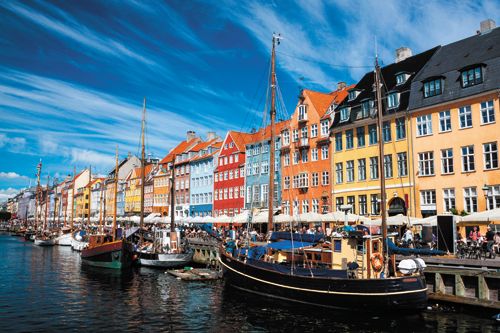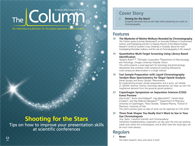Copenhagen Symposium on Separation Sciences (CSSS) Event Preview
The Column
The 2nd Copenhagen Symposium on Separation Sciences (CSSS 2018) will be held on 26–27 June 2018 at the DGI-byen in Copenhagen, Denmark. The preliminary programme of the 2nd CSSS is summarized below and gives an idea of what can be expected.
Photo Credit: Bucchi Francesco/Shutterstock.com

Jörg Kutter1, Bente Gammelgaard1, Inga Bjørnsdottir2, Carsten Boye Knudsen3, and Stig Pedersen-Bjergaard1,4,1Department of Pharmacy, University of Copenhagen, Copenhagen, Denmark, 2Novo Nordisk, Måløv, Denmark, 3Zealand Pharma, Glostrup, Denmark, 4School of Pharmacy, University of Oslo, Oslo, Norway
The 2nd Copenhagen Symposium on Separation Sciences (CSSS 2018) will be held on 26–27 June 2018 at the DGI-byen in Copenhagen, Denmark. The preliminary programme of the 2nd CSSS is summarized below and gives an idea of what can be expected.
Analytical separation sciences-including chromatography, electrophoresis, mass spectrometry, and sample preparation-play a vital role in the pharmaceutical industry, and the implementation of new concepts, technologies, and applications is a continuous process to support discovery, development, and manufacture of pharmaceutical products. While the analytical applications are developed by the pharmaceutical industry, the new analytical concepts and technologies are traditionally developed by vendors and academia. Strong scientiï¬c interactions between the pharmaceutical industry, academia, and vendors are therefore very important, and this is the purpose of the Copenhagen Symposium on Separation Sciences (CSSS). CSSS is a twoâday symposium where separation scientists from the pharmaceutical industry, academia, and vendors interact and discuss separation science.
The scientiï¬c programme is designed to be highly attractive for both industry and academia. The programme will comprise 18 invited plenary lectures by internationally leading separation scientists, submitted posters presented by participants, discussion sessions, and a symposium dinner. In addition, an exhibition of instruments, equipment, and consumables is an important and integrated part of the scientiï¬c programme. The talks by leading scientists will provide perspective, fundamentals, insight, and glimpses of how the field of separation sciences is developing.
Scientific sessions will include: the longâterm perspective; recent progress in liquid-phase chromatography and electrophoresis; recent progress in microfluidics; recent progress in immunoaffinity techniques; forefront applications of mass spectrometry; forefront biopharmaceutical characterization; and ADME and pharmacometabolomics. Confirmed speakers include: Michael Lämmerhofer; Gert Desmet; Peter Myers; Frantisek Foret; Alberto Cavazzini; Detlev Belder; Myriam Taverna; Trine Grønhaug Halvorsen; Kevin Pagel; Petur Weihe Dalsgaard; Deirdre Cabooter; Isabelle Kohler; Christian Janfelt; Davy Guillarme; Elena Dominguez Vega; and Nikoline Juul Nielsen.
The first CSSS was organized in June 2016 with close to 100 participants. This successful symposium was initiated by Steen Honoré Hansen from the University of Copenhagen. Steen was a pioneer in separation sciences applied to pharmaceutics, but he unfortunately passed away on 31 October 2017. The CSSS series will be organized to honour Steen and his great contribution to separation sciences and pharmaceutical chemical analysis.
The CSSS series is internationally oriented and the symposium language is English. CSSS is a biannual event in June in the beautiful city of Copenhagen. Copenhagen has a very strong pharmaceutical base in the area, and is also nicknamed Medicon Valley. Medicon Valley is currently one of Europe’s top three sites for biotech innovation alongside Cambridge in the UK, and Basel in Switzerland. The Medicon Valley hub comprises the area of eastern Denmark and south-western Sweden connected via the Oresund Bridge. It is home to a large number of life science and pharmaceutical companies and research institutions located within a very small geographical area. Medicon Valley hosts a total of 12 universities, including the University of Copenhagen and the Technical University of Denmark. Danish pharmaceutical giants such as Novo Nordisk and Lundbeck all have research centres in the region.
The Copenhagen Symposium on Separation Sciences 2018 will take place in the modern facilities of DGI-byen in the heart of Copenhagen, within walking distance of the Central Station. The Central Station can be reached in 20 min by train from the international airport of Copenhagen.
The members of the scientific committee are Jörg P. Kutter (Chairman, University of Copenhagen), Bente Gammelgaard (University of Copenhagen), Inga Bjørnsdottir (Novo Nordisk), Carsten Boye Knudsen (Zealand Pharma), and Stig PedersenâBjergaard (University of Oslo, University of Copenhagen).
The organizers warmly welcome participants from industry and academia, working with pharmaceuticals or not, but with interest in analytical separation science, to join the symposium.
E-mail: contact@cphsss.org
Website:https://cphsss.org/

Understanding FDA Recommendations for N-Nitrosamine Impurity Levels
April 17th 2025We spoke with Josh Hoerner, general manager of Purisys, which specializes in a small volume custom synthesis and specialized controlled substance manufacturing, to gain his perspective on FDA’s recommendations for acceptable intake limits for N-nitrosamine impurities.













